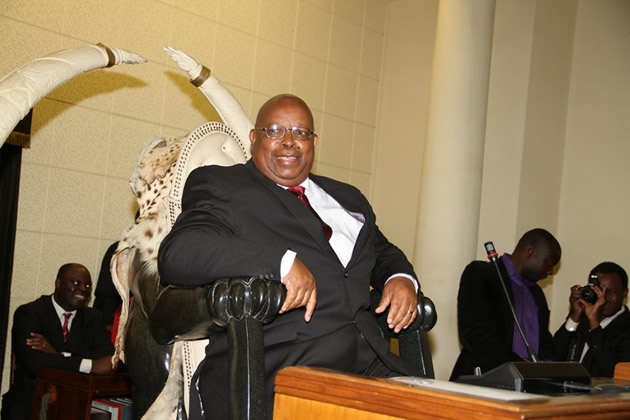Parliament’s conundrum on party renegades

Lloyd Gumbo Mr Speaker Sir
The past two weeks or so have put Parliament to test as to how to interpret the law on MPs crossing the floor and how one ceases to represent the party on whose ticket they were elected. What is clear is that every case has to be considered on its merits and not on a one size fits all basis given the different circumstances under which political parties have sought to recall legislators from Parliament.
I will not burden readers on the background to the MDC-T’s initial request to recall Renewal Team MPs last year because that is now water under the bridge.
Different circumstances call for different considerations.
Zanu-PF successfully recalled Didymus Mutasa and Temba Mliswa from Parliament because of their puerile disregard for the leadership.
As such, they were expelled from the legislative arm of the State under Section 129 (1) (k) of the Constitution that states that the seat of a Member of Parliament becomes vacant, “if the member has ceased to belong to the political party of which he or she was a member when elected to Parliament and the political party concerned, by written notice to the Speaker or the President of the Senate, as the case may be, has declared that the member has ceased to belong to it”.
Despite an initial request by MDC-T leader Morgan Tsvangirai to have Renewal Team MPs fronted by Tendai Biti recalled hitting a snag after the Speaker referred them to court for a determination of the leadership of the party, the former’s formation has come knocking on his door again given the different circumstances from the earlier one.
While Zanu-PF has succeeded in recalling Mutasa and Mliswa using Section (129) (1) (k), there is legitimate expectation within MDC-T that the Speaker will finally give a nod to their request given the different circumstances at play.
Never mind the drama that panned out last year when Tsvangirai and Biti’s factions counter suspended and expelled each other, which made it difficult for the Speaker to determine who the legitimate leader was.
It goes without saying that Tsvangirai’s faction then held a congress where they secured a fresh mandate to lead the party and whose outcome has not been challenged in a court of law.
The absence of such a challenge means that its outcome and resolutions – the expulsion of Renewal Team MPs included – is legally binding, as such any efforts by the new leadership to regularise what it feels were anomalies in its leadership and membership should be binding as well.
After failing to oust Tsvangirai and his team, Biti and his team went ahead to rebrand their formation to the extent of removing the “T” from the party name under whose banner they were elected to Parliament as well as giving themselves a new name that is MDC Renewal Team.
It is clear that by that action alone MDC Renewal had become a new entity whose name is not in the Zimbabwe Electoral Commission nomination papers for the July 2013 harmonised elections.
To compound matters, they went ahead to form a coalition with Professor Welshman Ncube’s MDC and came up with a new name, UMDC.
It means those MPs who were elected under the MDC-T are still referred and considered MDC-T representatives even for parliamentary administrative purposes yet they have since abandoned that party.
Forming a party is enough evidence that they no longer belong to the MDC-T.
That alone is sufficient to create a prima facie case against them.
There is therefore no legitimate justification for remaining in Parliament under the name of the MDC-T.
While some quarters have sought to present the Zanu-PF versus Mutasa and Mliswa case and the MDC-T against Renewal case as different, they are similar inasfar as the issue at hand is concerned.
If Zanu-PF’s case involved renegades then what does the MDC-T one involve?
Professor Lovemore Madhuku is on record arguing that whenever there is a dispute, the courts are the legitimate platform to resolve it.
But in this instance Section (129) (1) (k) of the Constitution would have been meaningless since every expelled MP would then approach the courts.
The effect of any such action would mean Parliament has no control over its administration, in the process throwing the idea of separation of powers into question.
All that is required is for the party concerned to notify the Speaker of the expulsion or recalling of its representative and nothing more.
There is no provision in the Constitution for recalled MPs to appeal either to Parliament or the courts after their expulsion.
The only time courts are involved in the expulsion of MPs is under Section (129) (1) (i) where it says the seat of a Member of Parliament becomes vacant if they are convicted “of an offence of which breach of trust, dishonesty or physical violence is an essential element and sentenced to imprisonment for six months or more without the option of a fine or without the option of any other non-custodial punishment, unless on appeal the member’s conviction is set aside or the sentence of imprisonment is reduced to less than six months or a punishment other than imprisonment is substituted”.
There is no need to bury our heads in the sand.
What Biti’s team should be doing now is to prepare for by-elections in their constituencies where they are likely to contest Zanu-PF and other smaller political parties given the fact that Tsvangirai’s faction has been claiming that it would not contest any elections until “there are electoral reforms”.
Turning to the Jonathan Samukange case that has also been brought to the attention of the Speaker – that is one complicated provision that was not well thought out, and whose objective was aimed at an individual.
Most people like Dr Alex Magaisa have cited Section (129) (1) (l) as the provision that must facilitate the expulsion of Samukange and claiming it to be a straight forward case yet it’s even more complicated than (129) (1) (k) covers.
The section says the seat of an MP becomes vacant “if the member, not having been a member of a political party when he or she was elected to Parliament, becomes a member of a political party”.
While one may contest an election as an independent candidate, determining if they are not a member of a political party is not as straight for- ward.
In the case of Samukange, he may argue that he was and still is a member of Zanu-PF who was denied the opportunity to contest on a party ticket because of factional politics.
He may even go further to give pictorial evidence of him distributing Zanu-PF regalia at his campaign rallies to his constituents where he implored them to vote for him as National Assembly member and Zanu-PF Presidential candidate Robert Mugabe.
Section (129) (1) (l) will not be easy even for drafters to explain what they meant because it is vague and has gaps.
If they meant what we assume then they should have been more direct that a seat becomes vacant “if a member, having been elected as an independent candidate, joins a political party” rather than refer to a member “not having been a member of a political party”.
Feedback: [email protected]








Comments